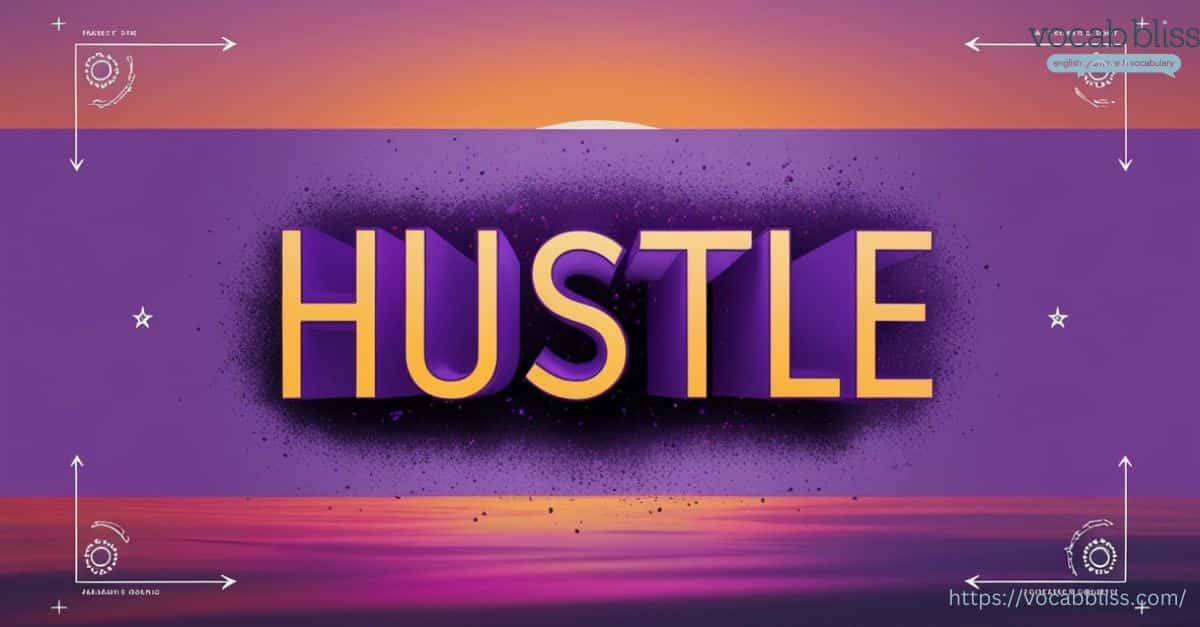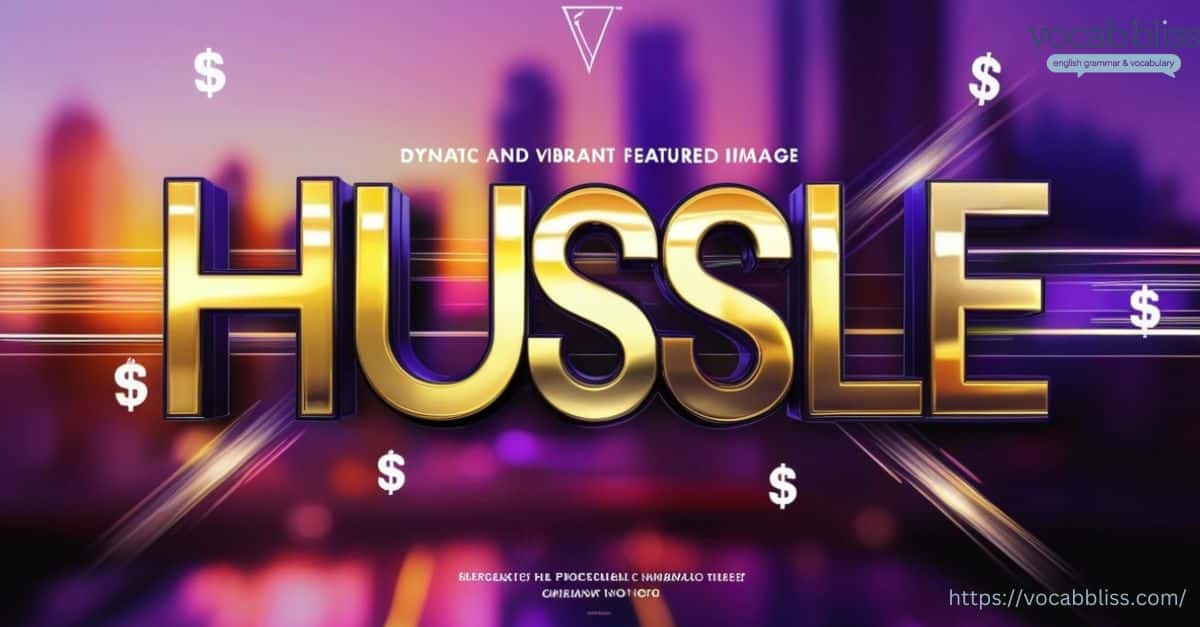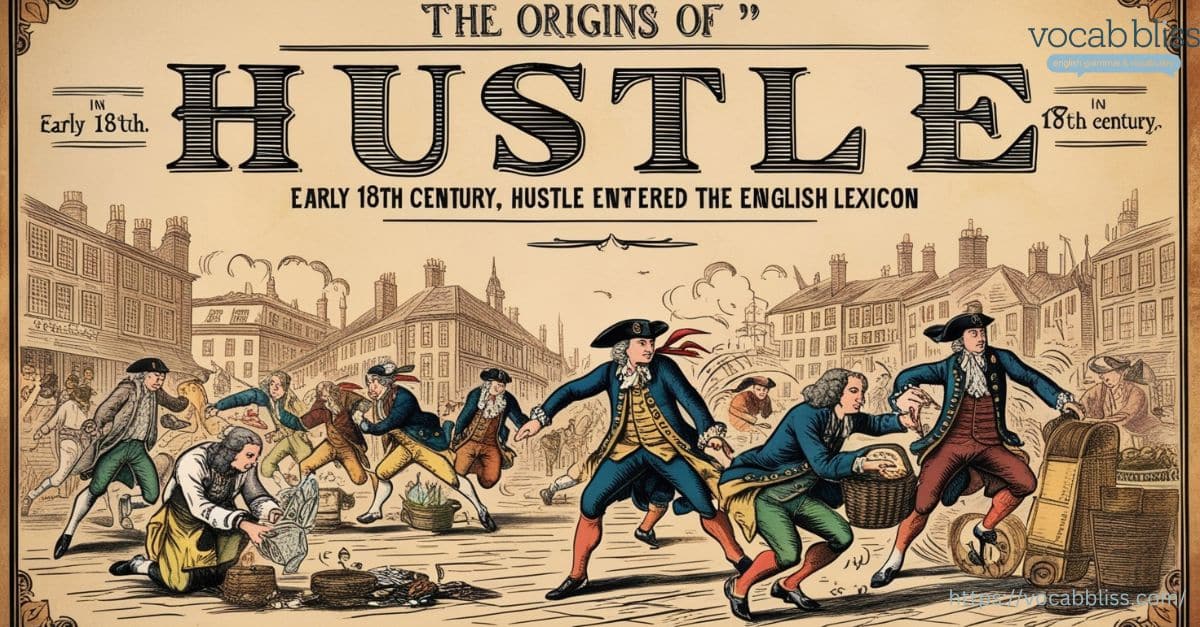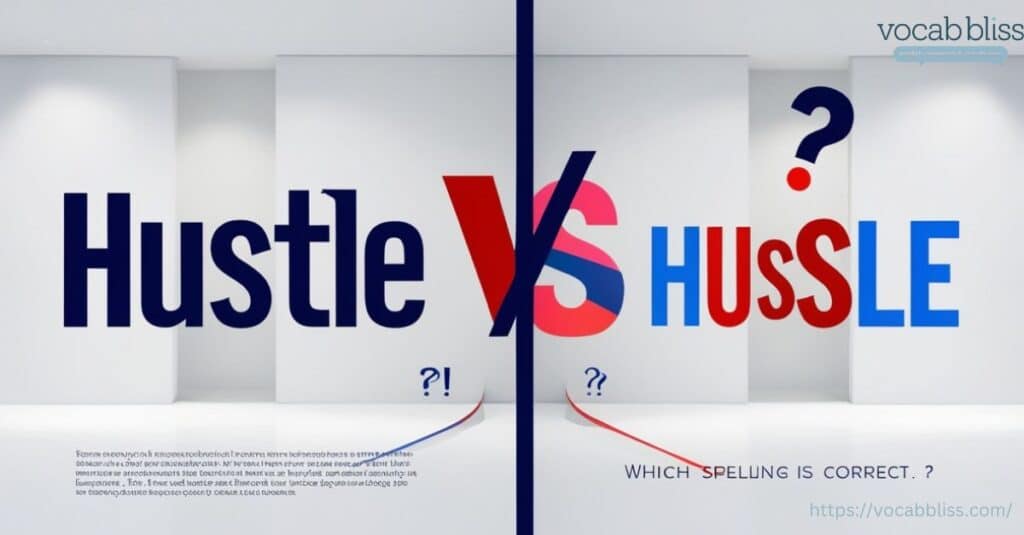In the fast-paced world of communication, words like hustle or hussle often surface, sparking questions about their correct spelling and usage. While hustle is widely recognized and used, hussle has gained informal traction, sometimes leading to confusion. This article dives deep into the “hustle or hussle” debate by thoroughly exploring their meanings, origins, and differences.
Furthermore, by the end, you’ll clearly understand how to use these words effectively in both formal writing and everyday conversations.
⚡ Quick Summary
The debate between “hustle or hussle” boils down to a matter of correct spelling and formal usage. Hustle is the recognized spelling in dictionaries, commonly used to describe energetic activity, determination, or effort, often tied to success in business or personal goals. In contrast, hussle is an informal variant, often considered a misspelling, but popularized by cultural influences like Nipsey Hussle. If you’re aiming for proper grammar and professionalism, hustle is the correct choice. Understanding the origins, synonyms, and practical usage of hustle ensures clear and effective communication in both formal and casual contexts.
Explore further: Other Than or Other Then: Which One Is Correct?
Understanding the Confusion hustle vs hussle
Common Usage Trends
The confusion between hustle vs hussle arises from their phonetic similarity. Both are pronounced the same way, making it easy to mistake one for the other. However, the distinction is clear once you delve into their definitions and usage contexts.
Adding to the mix, popular culture often plays a role in promoting non-standard spellings. For instance, Hussle became widely known through the late rapper Nipsey Hussle, whose stage name reinforced the informal spelling. Despite this, the correct spelling in formal writing remains hustle.
Role of Misspellings in Language
Misspellings like hussle often stem from regional dialects, slang, or even typographical errors. Over time, some misspellings gain informal acceptance, but they usually don’t replace the standard word in dictionaries.
Hussle or Hustle Meaning
“Hustle”

Definition: According to major dictionaries like Merriam-Webster and Oxford English Dictionary, hustle is a versatile word that functions as both a noun and a verb. It means:
- As a verb: To move or work with great energy and determination (e.g., “She hustled to meet the deadline”).
- As a noun: Energetic activity or hard work (e.g., “The hustle of city life”).
Connotations: Hustle often conveys positivity, suggesting ambition and effort. However, it can also imply dubious or forceful behavior, such as in “to hustle someone out of money.”
Examples in Sentences:
- “Entrepreneurs must hustle to turn their ideas into successful businesses.”
- “The marketplace was filled with hustle and bustle.”
Synonyms:
| Positive Connotation | Negative Connotation |
|---|---|
| Work hard/Working hard | Swindle |
| Strive | Coerce |
| Push forward | Cheat |
“Hussle”

Definition: The word hussle is not recognized in standard dictionaries. However, it is often considered a misspelling of hustle. In fact, its usage is primarily informal and colloquial, and it is often associated with slang or branding.
Examples in Sentences:
- “Nipsey Hussle’s legacy inspires many to work hard for success.”
- “Some mistakenly write hussle when they mean hustle.”
“Hussle vs Hustle”: Key Differences
| Aspect | Hustle | Hussle |
|---|---|---|
| Spelling | Correct | Informal/Misspelled |
| Recognition | Listed in dictionaries | Not formally recognized |
| Usage Context | Formal and informal | Slang or branding |
| Meaning | Energy, effort, work | Same as hustle (informal use) |
The primary takeaway is simple: if you’re writing for formal contexts like business, education, or publications, always use hustle.
Synonyms and Related Words
Synonyms for “Hustle”

- Effort
- Drive
- Strive
- Push
- Ambition
- Determination
- Energy
Related Misspellings
Some common misspellings of hustle include:
- Hussle
- Husstle
- Hustell
Always double-check spelling, especially in professional writing.
Practical Usage of “Hustle”
Understanding how to use “hustle” correctly in sentences is key to leveraging its versatility in both formal and informal contexts. As a word with multiple meanings and connotations, hustle works as both a noun and a verb, often linked to energy, determination, and effort.
As a Verb
When used as a verb, hustle describes taking quick action or working energetically toward a goal. It can also imply a sense of urgency or assertiveness.
Examples in Sentences:
- “She hustled through the crowded airport to catch her flight.”
- “They hustled to finish the presentation before the deadline.”
- “The salesperson hustled to close the deal by the end of the day.”
Grammar Tip: Always pair hustle with an action or goal to convey purpose and energy.
As a Noun
As a noun, hustle refers to energetic activity, hard work, or even a scheme, depending on the context. For example, it can describe the hustle and bustle of city life or the drive to succeed in business. On the other hand, in a more negative sense, it might refer to a shady scheme or trickery.
Examples in Sentences:
- “The hustle of the city never seems to stop.”
- “His hustle and dedication led to a promotion.”
- “Side hustles have become a popular way to earn extra income.”
Grammar Tip: When using hustle as a noun, context determines whether it conveys a positive effort or a dubious scheme (e.g., “a hustle to make quick money”).
Positive and Negative Connotations
| Positive Usage | Negative Usage |
|---|---|
| Reflecting effort, ambition, and energy | Implying manipulation or deceit |
| “She hustled to achieve her dreams.” | “He hustled the tourists for money.” |
Formal and Informal Usage
- Formal Contexts: Use hustle to describe hard work or proactive behavior.
Example: “In business, hustle is a key factor for success.” - Informal Contexts: Use hustle to describe quick action or a side activity.
Example: “I’ve got a side hustle designing websites.”
Tips for Using “Hustle” Correctly
- Match the tone to the context. Use hustle positively in professional or motivational writing and carefully in informal settings where slang is acceptable.
- Be mindful of connotations. Ensure clarity by pairing hustle with context-specific verbs, nouns, or adjectives.
- Use mnemonic aids. Remember hustle for action and effort, as in “hustling for success.”
By applying these principles, you can confidently incorporate hustle into your vocabulary, showcasing your understanding of its meaning and versatility.
The Origins of “Hustle”

The word spell hustle has a fascinating history rooted in European linguistics. Its journey began with the Dutch word husselen, which means “to shake or toss.” This term was commonly used in the 17th century to describe physical actions, such as stirring or jostling. As Dutch traders and settlers spread across Europe and beyond, their language influenced English, introducing words like hustle.
By the late 17th and early 18th centuries, hustle entered the English lexicon, initially retaining its physical connotations. Over time, its meaning expanded to include concepts of urgency and vigorous activity. For instance, by the 19th century, hustle was used to describe bustling towns or energetic individuals.
In modern usage, hustle embodies not just movement but also effort, determination, and a proactive attitude. It has become synonymous with ambition, particularly in entrepreneurial and business contexts. Phrases like “side hustle” and “hustle culture” reflect its evolving role in society, where it now symbolizes the drive to achieve goals through hard work and creativity.
This linguistic evolution underscores the versatility of hustle, a word that has adapted to mirror the energy and determination of those who embody it.
Etymology
The word hustle originates from the Dutch word husselen, meaning “to shake or toss.” It entered the English language in the late 17th century, evolving to encompass meanings related to energetic movement and effort.
Evolution Over Time
Initially, hustle referred to physical movement. Over the centuries, its meaning expanded to include mental and emotional energy, particularly in business and personal ambition.
FAQs
Is “hussle” ever correct?
No, hussle is considered a misspelling of hustle in formal contexts. However, it has been popularized in slang and branding.
Why do people spell it “hussle”?
This misspelling is often due to phonetic similarities and the influence of pop culture, such as Nipsey Hussle’s stage name.
How can I remember the correct spelling?
Think of hustle as “hurry + muscle,” emphasizing effort and energy.
Final Thoughts on “Hustle” vs. “Hussle”
In conclusion, hustle is the correct spelling for formal writing and is widely recognized in dictionaries. While hussle might appear in informal contexts, its use should be limited to avoid confusion. Understanding the differences, origins, and usage of these words ensures you communicate effectively and professionally.
So the next time you face the “hussle or hustle” dilemma, remember to hustle—not hussle—your way to clarity!
Dive Deeper:
- Excel vs Accel: Can You Spell It Right?
- Excell or Excel: Which Spelling is Accurate?
- Pronounciation Or Pronunciation: Which Is Correct?
- Connecter or Connector: What’s the Correct Spelling?

Jorge Phillips is an experienced blogger who writes for Vocab Bliss, sharing his passion for the English language. With a knack for simplifying complex grammar rules and a focus on commonly confused words, Jorge helps readers navigate the nuances of English with ease. His insights aim to make learning engaging and practical.







